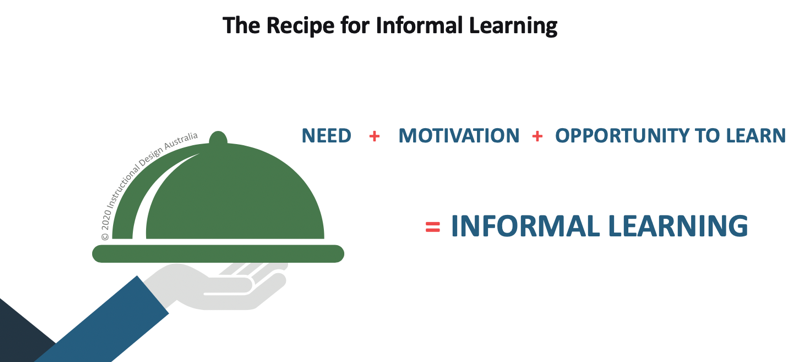Informal Learning
Informal learning (or incidental learning) is unstructured, experiential and generally occurs spontaneously, outside of the formal learning setting [1].
Informal learning supports adult learning principles, as it is learner-focused and personalised [2]. Due to its informality, most informal learning is tacit, with many people unaware of their newly developing understandings and skills [3].
So – how can we promote informal learning?
The Recipe
Need + Motivation + Opportunity to Learn = Informal Learning
Informal learning occurs when people have the need, motivation and opportunity to learn [4].
What does an environment that fosters these three elements look like?
Needs
Support employees in identifying their learning needs by encouraging regular reflection and scheduling performance reviews.
Performance reviews
Through performance reviews, employees become aware of strengths, as well as areas they can improve on.
Motivation
Adults are motivated through autonomy, mastery and purpose [5]. Having meaningful conversations that uncover personal values and interests will help teams to tap into intrinsic motivation – and external motivation is typically driven by performance rewards (development opportunities, salary and bonus schemes).
Autonomy
Provide employees with some freedom to make decisions about the ‘how’ of achieving outputs and bringing strategic goals to life. Research shows that autonomy increases job satisfaction, productivity, engagement and commitment [6].
Mastery
Deliberately notice your people’s progress and encourage them to ‘step up’ to challenges and reach their potential. Experiencing and being recognised for this growth will impact discretionary efforts to further develop and master key capabilities for successful performance.
Purpose
Help people to find purpose in their work. Those who can see the ‘bigger picture’ are more productive, engaged and motivated to do their best and improve.
Opportunity to learn
Create learning opportunities by supporting collaboration, networking, coaching and mentoring, and by encouraging questioning and constructive feedback.
Hold career-planning workshops to also encourage employees to identify learning avenues available to them, and to plan a capability development pathway.
In addition to the above practices, embedding a life-long learning mindset is the foundation of informal learning [7]. The more that people recognise that learning is continuous and occurs through everyday experiences (not just when provided with a formal learning ‘event’), the more they will begin to notice their own growth and become conscious of the learning opportunities surrounding them.
Related Articles and Blogs
Read more of our blog articles here.
References
[1] Burns, J., Z. Schaefer, K., (2003). Informal Learning: An Exploratory Study of Unstructured Learning Experiences of T&I Teachers Enrolled in an Alternative Teacher Education Program. Journal of Industrial Teacher Education, v40 n3 p6-24 Spr 2003
[2] [3] [4] Marsick, Victoria & Watkins, Karen. (2001). Informal and Incidental Learning. New Directions for Adult and Continuing Education. 2001. 25 – 34. 10.1002/ace.5.
[5] Pink, D. H. (2009). Drive: The surprising truth about what motivates us. New York, NY: Riverhead Books.
[6] Nishitha. (September 4, 2017). Autonomy: How to Use It to Motivate Employees. Retrieved from Retrieved from https://wittysparks.com/autonomy-in-the-workplace/
7] WIOA Australia (2019). The Technical Competency Handbook: Knowledge, skills and competency development for water industry operations staff.



